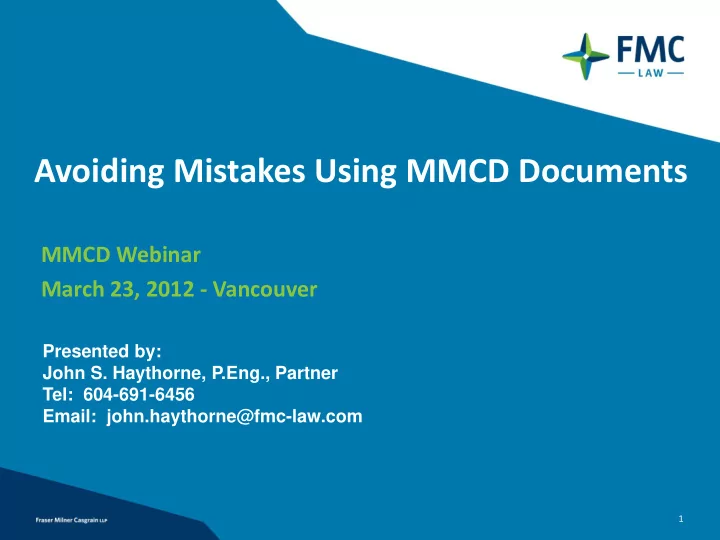

Avoiding Mistakes Using MMCD Documents MMCD Webinar March 23, 2012 - Vancouver Presented by: John S. Haythorne, P.Eng., Partner Tel: 604-691-6456 Email: john.haythorne@fmc-law.com 1
Overview 1. “Don’t worry – we don’t have a contract – I didn’t sign anything” 2. “Of course I negotiated the bid prices down, they were ridiculous; he knew it and I knew it” 3. “Let's put the project out to tender to see if we can do this project” 4. “He wouldn't dare sue; he'd never get another job from me again if he did” 5. “I remember when we did it all on a handshake; we just worked it out and everyone was happy” 6. “...And then it got into the hands of the lawyers...” 7. “We don't have time to re - tender this project” 2
“ Don’t worry – we don’t have a contract – I didn’t sign anything ” • Contract formation and amendment – Contract = offer + acceptance – Oral, in writing, or both – Amend in same way – oral or in writing (email) – Writing is just proof – MMCD – usually tender to create contract – MMCD: Rules to form/award contract imbedded in Instructions – Remember – Contract A is formed at Closing – Select successful Tenderer – enter into Contract B 3
“Of course I negotiated the bid prices down, they were ridiculous; he knew it and I knew it” • Duties of Owners under Tender – “Competition replaces negotiation” – Duty to follow express terms of Contract A – MMCD has rules (Contract A) •Define owner’s authority IT15.0 • Issues the Owner may consider • Owner has limits 4
“Let's put the project out to tender to see if we can do this project” • Owner’s duty of good faith • Owner cannot bid shop • By going to the market the Owner is saying, by implication, that it has authority, and funding and is serious about proceeding with the Contract 5
“He wouldn't dare sue; he'd never get another job from me again if he did” • True that most disputes settle - litigation is rare but does happen • Poor defense to rely on Contractor not enforcing rights • The implication is that contract rights are formality that are not to be respected – followed by “up - tight” folks • “Waive any defect or deficiency in a tender which does not materially affect the tender or the Tender Price relative to other tenders and accept that tender” 6
“I remember when we did it all on a handshake; we just worked it out and everyone was happy” • “I don’t know why we spent the time on that contract – we both just put it in the bottom drawer and never looked at it ” • Why have a written contract? • What is the purpose of a written contract? • The new mantra - allocation of risk 7
“ ...And then it got into the hands of the lawyers... “ • Why did it go to the lawyers? • MMCD Dispute Resolution Process (see flow chart) • Smart Money – make it in both parties’ interest to settle • Difference between engineer and lawyer • Communications – emails; notes to file – you may be speaking into the microphone – Discoveries – FOI 8
“We don't have time to re -tender this project" • What to do when all Tenders are over budget, or no Tender is acceptable? – Over-riding duty of fairness – Read Instructions to Tenderers – duty is to comply with rules (terms of Contract A) – Right under MMCD to terminate process IT 15.1.1 9
MMCD Documents • Originally written by group representing Owner, Contractors and Consultants – “The objectives were to be fair to all parties, to minimize the need for risk taking by the Contractor, and to provide an equitable means of resolving disputes and addressing changes.” • Easy to write a harsh, one-sided contract – or to change the balance of MMCD by inclusion of Supplementary General Conditions – question is whether this serves the parties’ interests? 10
Avoiding Mistakes Using MMCD Documents MMCD Webinar March 23, 2012 - Vancouver Presented by: John S. Haythorne, P.Eng., Partner Tel: 604-691-6456 Email: john.haythorne@fmc-law.com
Recommend
More recommend